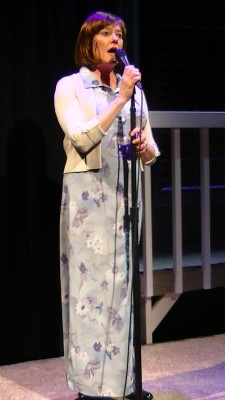Kingdom of Heaven: The Church of Latter-day … Drag?
Art
The journey of self-discovery is and will continue to be the most universal path of the human experience. It is more universal than love and friendship; in fact, self-discovery can greatly alter and complicate relationships based on what it is we uncover about our inner selves. Jenifer Nii’s original musical, Kingdom of Heaven, explores these relationships when Mormon housewife MaryJane (MJ) discovers a direction that could forever alter her life and the lives of those around her: MJ desires to become a drag king. Playwright Nii and director Jerry Rapier are nearly finished with the process of creating this interesting and unique musical, which Plan-B Theatre Company will premiere on March 31.

If the concept of an LDS member becoming a drag king isn’t provocative and intriguing enough, Nii decided that the story of MJ needed to happen in the form of an 80-minute musical. “I had been binge-watching a certain reality television show about drag queens with some friends,” she says, “and in a moment of spontaneity, I posted on social media, ‘I want to write a musical.’” It only took Rapier half a second to respond to Nii’s proposal. “When Nii—well, I wouldn’t say ‘pitched’ the idea—threw it against the wall to see if it would stick, it made sense to me to give [the musical] a shot,” Rapier says. “[Nii] realized, ‘I have to write a musical. I don’t know how to write a musical!’ and I said, ‘We can write it any way we want.’” Taking a leap of faith, Nii and Rapier collaborated together to create what will be Plan-B Theatre Company’s first original musical—and what better way to do this than to produce a story about a drag king?
Plan-B’s mission is to produce stories by local playwrights that have local roots. But this season is particularly special: This year is Plan-B’s 25th anniversary. “We’re trying to push the boundaries beyond what we’ve done previously to really focus on the theatricality—not just the social consciousness of what we’re doing,” Rapier says. “We’re trying to do things we’ve never done before in ways we’ve never done before,” hence the musical aspect. Not only will this musical be produced during the company’s season for pushing boundaries, but it is also happening during an intense, heated political season. “People are saying, out loud, things they have perhaps thought in the past, but not actually [said to] other people,” says Nii. “I’m hoping that when things cool, we’ll be able to have a meaningful discussion.” These meaningful discussions are what Nii hopes to accomplish during the run of Kingdom of Heaven. For her, the theatre should give audience members something to talk about or change how they see the world around them. “It’s what separates it from the other arts,” she says.
Gender—including trans issues and gender roles—clearly is a hot topic in current social media, and because of this trend, gender is a hot topic with the LDS Church. Salt Lake City hosts a dominant power: the church itself. But SLC also carries the voices and houses the lives of many LGBTQ+ individuals. Kingdom of Heaven portrays the life of MJ as an aspiring drag king in question of her gender and seeks to illustrate members of the LDS church who may struggle with similar, life-altering changes. “Hopefully, it will feel like this is a person speaking from a real point of view and not just a point of view speaking,” says Nii. Her reasons for writing about these two opposing points of view are embedded in the fact that we, as a society, need to start answering questions about gender. “The LDS Church is very powerful—and I want to say that as respectfully as I can,” Nii says. “They have deep roots. They have faced and are facing questions about the roles that their members play. Increasingly, we are finding gender coming to the surface. It has been fascinating to see the ways they have—and have not—responded, and [to see] the effects those non-responses have,” Nii says. “People have been devastated. Families have been devastated. [The church] is now in a position where they have to reconcile many things without a lot of precedent to fall back on, without a lot of clarity to move forward, and I wanted to do the best I could to highlight the very real effect that decisions have and the very real struggles people are facing.”
Though this may seem one-sided, Nii has made sure that the musical displays a balance of opinion and will illuminate many points of view. “Think what you may about an organization—particularly a dominant organization,” she says. “The people within that organization are human and deserving of compassion and discussion.” Her goal is to faithfully represent these characters and where they would be on their journey—rather than demonizing any of them. “I didn’t want to make [anyone] some sort of bad guy. It’s hurtful and harmful,” she says.

